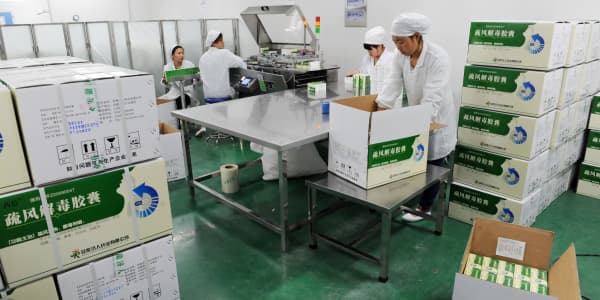Amid steeply declining initial public offering activity in China this year, there's an ongoing push by the country to lure its tech companies to come back home to list.
There were only 35 IPOs in China during the first quarter, according to professional services firm EY. That's a 74 percent decline compared to the same period in 2017, and it only included five tech listings, the study said.
Consequently, proceeds reaped from IPOs in the country fell 39 percent year-over-year.
The reason for the slowdown, according to EY, is that Chinese companies are finding it more difficult to win regulatory approval. But there's another challenge for China's IPO market: Companies are still drawn to U.S. markets for the prestige — even though they aren't always doing so well there.
The plan
China is now allowing tech companies easier access to domestic investors. Authorities have endorsed the Chinese depositary receipts (CDRs) scheme, which will allow investors to hold a form of shares in firms listed abroad.
But the new change will likely benefit only a few companies for now. In its current form, the scheme will cover listed tech firms with a market capitalization of more than 200 billion yuan (about $32 billion), and unlisted tech firms with valuations of more than 20 billion yuan.
Based on that, only five listed names may qualify, said Frank Lee, senior investment strategist at DBS Bank: Tencent, Alibaba, Baidu, JD.com and NetEase.
Many market watchers, however, predicted the scheme will eventually be extended to the rest of the industry.
Still, there may be execution problems, Lee said, as the CDRs are technically not shares. It could be priced differently from shares, and if investors find a way to convert them to equity listed elsewhere, it could lead to a problem of funds flowing out of the country. That would be a problem for Beijing's strict capital controls.
"Would CDRs be converted into the underlying shares? If yes, it loops back to the problem of capital control. If no, there may be a huge price difference between the CDRs and the underlying stocks, which will adversely affect demand," Lee said.
Launch problems
Adding to any execution difficulties is that most companies needing to raise capital fast will likely still find the overall process in the East Asian country too slow compared to in the U.S.
In the U.S., it may take between six months to a year for an IPO to be approved, explained EY's Ringo Choi, APAC IPO Leader. In China, however, it could take three to five years, he said, pointing to statistics from 2016.
But for tech giants, China has gone out of its way to cut down the notoriously long wait times.

Exceptions have been made to fast-track companies such as Foxconn — a major supplier for Apple — to as brief as between 23 to 40 days, Choi said.
"For smaller tech companies, they would still have to go through those long queues and scrutiny before getting approvals. But fast-growing companies need cash, and their investors might be pushing them to list as soon as possible," he said.
Meanwhile, the U.S. has been a more attractive environment for investors, with better valuations and a more knowledgeable investor base, experts said.
"The largest most liquid capital markets are in the U.S. and investors are familiar with high growth and tech names. Mainland China with its capital restrictions and a slow IPO approval process is not yet a good option for large fast growing tech names," said Kathleen Smith, manager of IPO ETFs at Renaissance Capital.
But many Chinese firms have seen their share price struggle after they go public due to fears of a trade war and overly high valuations dampening sentiment, market watchers said.
"Unfortunately, these IPOs (ex micro cap) have performed poorly and this poor performance will slow down upcoming Chinese deals," Smith said.
"This is a typical pattern: Investors get comfortable with emerging markets, Chinese IPO activity picks up, if returns are good, activity continues, if bad returns, issuance slows," she added. "Right now we are getting headwinds from tariff discussions and we expect to see a slowdown in Chinese issuance."
Will the tides turn?
In the long run, Asia might prove more attractive for fast-growing Chinese companies if regulatory barriers are worked out. That's because of growing protectionism in the U.S., while investors in their home region may be more supportive.
"Obviously there's a lot of savings in China, and ... the Chinese are more confident in Alibaba than the Americans are. I think the local investors understand them better, the Chinese perspective is very different," said Sukumar Rajah, director of portfolio management, emerging markets equity at Franklin Templeton Investments.
Chinese investors, he added, won't be as easily "scared" by "fake news" about their homegrown companies.
Already, some companies may be eyeing a listing at home.
In an email to CNBC, Alibaba said: "Since our IPO in the US, we have stated that if regulations allow, we would consider a listing in China."





